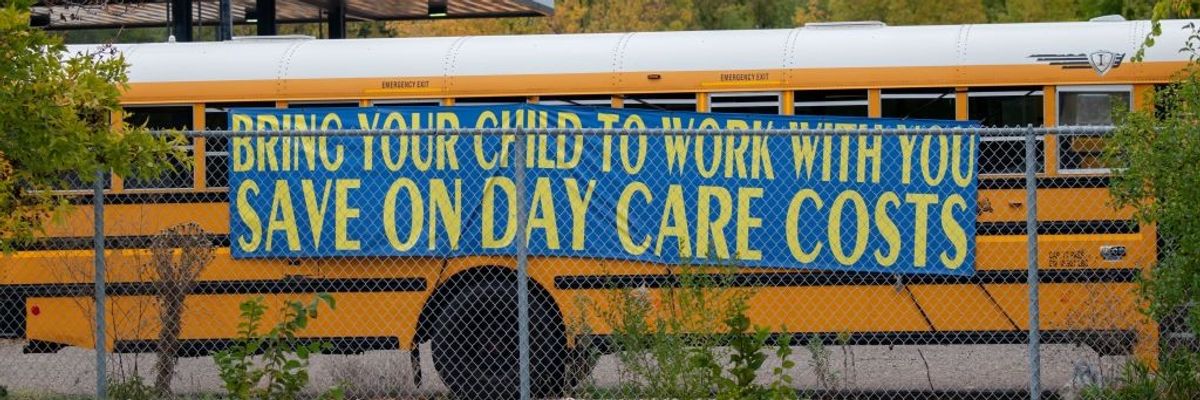"If we can afford to spend over $1 trillion on tax breaks for the top 1% and large corporations making record-breaking profits, we can afford to provide working class families with the childcare they desperately need."

A sign in St. Paul, Minnesota advertising for bus drivers and bring your child to work with you.
(Photo by: Michael Siluk/UCG/Universal Images Group via Getty Images)
JON QUEALLY
Feb 25, 2024
COMMON DREAMS
A survey of early childhood educators and caregivers released Sunday shows the post-pandemic collapse of federal funding is fueling a national crisis for young children and their families as centers suffer and out-of-pocket costs soar.
The findings of the survey—titled "We Are NOT OK" and put out by the National Association for the Education of Young Children (NAEYC)—resulted from questions posed to over 10,000 professionals in the early childhood education sector.
Of those polled, more than 50% reported staffing shortages in the various kinds of centers they own or operate, including faith-based programs, family child care homes, Head Start facilities, and childcare centers. Those shortages, according to respondents, stem in part from low wages and burnout from staff who are overloaded but underpaid since federal support dried up.
"Significant public investment in child care is needed urgently to ensure programs can retain qualified educators and remain open to serve children and families."
Rising costs but diminishing support from public subsidies have forced operators to increase tuition which in turn has put pressure on families to withdraw—creating a vicious loop.
"The loss of federal funds that helped the early childhood sector weather the pandemic has exacerbated long-standing challenges like low wages and high operating costs, leading to staff shortages, program closures, and rising family tuition rates," said Michelle Kang, the CEO of NAEYC.
Among other key findings of the 50-state survey:56% of center directors and family childcare owner/operators said they were under-enrolled relative to their current capacity, with the reasons varying from staffing shortages (89%), low pay (77%), and lack of affordability for families (66%).
55% of all respondents were aware of at least one childcare program closing in their community in the past six months, while only 30% were aware of a new program opening. 11% said four or more programs had closed in their community in that time.
36% of center directors and family childcare owner/operators reported increased rent costs and half reported increased insurance costs over the past 6 months. To cover costs, 48% increased tuition rates for families.
46% of all respondents reported increased burnout since January 2023. 32% said their economic situation has worsened, compared to only 16% who said it has improved.
Such troubling findings, said Kang, make clear that "significant public investment in child care is needed urgently to ensure programs can retain qualified educators and remain open to serve children and families."
Republicans in Congress, joined by too many right-leaning Democrats, have backpedaled on social spending in the wake of the pandemic. Multiple economic analyses and reams of data have shown that public investments in childhood education and poverty reduction had immediate and far-reaching positive impacts, but austerity-guided policies and refusals to raise federal revenues by taxing the rich or corporations have seen those gains erased.
Last fall, Sens. Patty Murray and Bernie Sanders put forward a bill to provide $16 billion in annual childcare funding over five years to prevent what experts predicted would be a childcare disaster.
"We are here today to sound the alarm and put forward a commonsense solution, before childcare providers might have to close their doors, before kids lose their childcare slots, and before parents could face higher costs—or simply be forced to leave their jobs to take care of their kids," warned Murray at a September press conference introducing the legislation.
No Republican in the Senate backed the measure and the bill still languishes in Congress thanks to GOP control of the U.S. House of Representatives.
On Thursday, Commissioner of the Internal Revenue Service Danny Werfel toldCNBC in an interview that the U.S. government loses approximately $150 billion annually from tax evasion by the nation's wealthiest individuals.
"When I look at what we call our tax gap, which is the amount of money owed versus what is paid for," said Werfel, "millionaires and billionaires that either don't file or [are] underreporting their income, that's $150 billion of our tax gap."
Earlier this month, the IRS announced that it could collect approximately $560 billion in additional tax revenue over the next decade so long as Republican lawmakers were thwarted in their efforts to claw back large portions of $80 billion in funding the agency was provided as part of the 2022 Inflation Reduction Act.
As the advocacy group Americans for Tax Fairness (ATF) said in response to Werfel's comments on Thursday, a $150 billion annually would amount to $1.5 trillion over the coming decade.
That's enough, ATF added, "to expand the Child Tax Credit for 10 years, lifting millions of kids permanently out of poverty. We can do great things when we crack down on wealthy tax cheats."
That $150 billion figure is also nearly ten times what it would cost to fund the Murray-Sanders childcare bill for one year.
As Sanders said in September, "If we can afford to spend over $1 trillion on tax breaks for the top 1% and large corporations making record-breaking profits, we can afford to provide working class families with the childcare they desperately need."
No comments:
Post a Comment